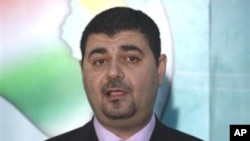Iraq's Sunni-backed Iraqiya faction on Saturday said it will stay with efforts to produce a national unity government in the country. This comes after an earlier walkout and harsh comments by the leader of the Iraqiya bloc, Ayad Allawi.
|
Wayne White, Middle East Institute, speaks with VOA's Susan Yackee about Iraqi politics:
|
Iraq's parliament sounded a conciliatory note Saturday, approving a political deal brokered by Kurdish President Massoud Barzani earlier this week which could lead to a new working government. The vote came despite harsh words from former Prime Minister Ayad Allawi in an interview with CNN Friday calling the recent power-sharing deal "dead." Mr. Allawi heads the Sunni-backed Iraqiya bloc in Parliament.
Iraqiya spokesman Haider al-Mulla told the Iraq Parliament Saturday that his party will take an active role in the formation of a national unity government and called a walkout by his party on Thursday, "a misundertanding."
Mr. Allawi was the big loser in Thursday's parliament meeting which resulted in the selection of rival incumbent Prime Minister Nouri al-Maliki to form the next government. Mr. Allawi's bloc was given the post of parliament speaker, as well as a new ombudsmen position without clearly defined powers.
The former prime minister insisted Friday that he would not be part of the next government, although he left open the possibility that members of his Iraqiya coalition might join. He also pessimistically predicted new tensions and violence facing the next Iraqi government.
Al Arabiya TV, however, reported that intense behind-the-scenes political discussions overnight had resulted in a softening of Mr. Allawi's position. Although Mr. Allawi was absent from Saturday's parliament session, most of the members of his bloc did attend.
The new parliament speaker, Osama Njeifi, who belongs to the Iraqiya bloc, went out of his way to endorse the concept of power-sharing to re-unite Iraq and stamp out terrorism.
He says that the current reality must be transformed into a better reality and that more effort must be exerted to build a united Iraq. He stresses that he and his colleagues agree to the concept of power-sharing and political decision-making, along with a unified security apparatus as agreed upon in (the recent) political pact and the government program.
Despite some tense exchanges with members of the new parliament Njeifi and most of those who spoke adopted a respectful tone and appeared to make every effort to avoid conflict.
One member of the broad Shi'ite National Alliance coalition behind Prime Minister Nouri al-Maliki also urged his colleagues from al Iraqiya not to boycott parliament and to settle their differences in accordance with normal parliamentary procedures.
He urges all political parties to not use the practice of boycotting whenever they don't agree with something that is on the table. Disagreements, he insists, are the fundamental basis of democratic systems across the world and they are always resolved by a vote of the majority.
Speaker after speaker addressing parliament Saturday spoke of the need and the desire to cooperate, and several members of parliament went so far as to apologize to the Iraqi people for the more than 8 month old political deadlock since elections in March.
Notwithstanding former Prime Minister Allawi's harsh words for Iraq's new power-sharing deal, most international leaders, including U.S. President Barack Obama have endorsed the pact as a step in the right direction. Many Iraqis have openly expressed hope that the deal holds and that it helps put an end to a recent upsurge in violence.




